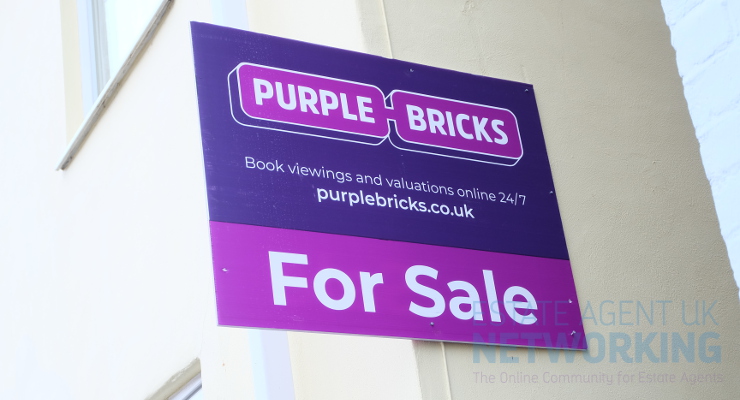BREAKING PROPERTY NEWS – 14/12/2021
Daily bite-sized proptech and property news in partnership with Proptech-X.
Is Purplebricks on the edge of collapse as share price drops 20% in a day?

All signs point to the fact that Purplebricks may be set to fail. Yesterday its share price tanked.
This is a shame because as a concept Purplebricks, an online national agent with no physical offices, a tiny workforce and a cash upfront fee model is a cash cow that cannot fail. Low running costs, and instant cash each time a property lists.
After obtaining close to £460 million of investment and cash from customers flowing through it since it started trading, its share price has gone from 96p to 568p to 25p yesterday. And its cash at bank has dwindled from £180 million to around £56 million at present, with looming liabilities that could eat all of that cash if the litigation that seems imminent comes to pass.
Yet it consistently lists more property than any other agent annually in the UK, so clearly it has a market, and yet it is on its knees…why?
In my opinion it has had no clear strategy for the past four years. Low spend on technology which should have been the key area of expense, a propensity for vanity projects, and worst of all a perceived indifference to the needs of the vendor client.
From my viewpoint, big businesses often fail due to the incompetence of the C-Suite, lack of planning, lack of leadership and lack of knowledge. Purplebricks was a digital business, with a great concept behind it. It looks likely to fail because the wrong people have been running it, thinking that investment would always cover their mistakes.
Pouring more cash into an enterprise with a CEO who has never sold a property in their life is questionable. Agency is a complex business, the top operational person should know that business backwards. Countrywide Plc. made the same mistake with Alison Platt.
Some pundits say that Purplebricks can weather the present storm, due to its £56 million reserve, but if its revenue (cash from instructions that it lists) drops by 40%, as nationally all agents have seen a 40% drop in instructions, then in six months it will burn another £6 million.
Add in the potential £9 million lettings liability due to the deposits scandal, that leaves £41 million of cash. But if the self-employed LPEs are really PAYE employees, and Purplebricks has to settle back payments to them and HMRC, they may have an extra liability of £20-£35 million, leaving very little cash to trade forward.
Purplebricks’ biggest problem is its 25p share price, which in turn affects its market capitalisation value. Add in the lack of C-Suite and Board governance, its mounting litigation problems, compliance problems, senior staff leaving and potential lack of revenue and it is easy to see why it has delayed reporting its latest standing to its shareholders.
Sixty thousand vendors a year use this company, which is huge. But the customer UX (vendor and landlord, buyer and tenant) is typically low, and that is what tech is meant to handle, but where is the high-level tech in this online business?
There is more tech on the apps of most ten-year olds’ mobile phones than in the Purplebricks empire. My advice to Purplebricks: Go truly digital or go home.
The Guild of Property Professionals teams up with Zero Deposit
The Guild of Property Professionals has recently partnered with Zero Deposit™ to bring all the benefits of a market leading and FCA regulated deposit replacement guarantee to its Members.
Iain McKenzie, CEO of The Guild, says it will help to enhance letting agent’s offering, by providing landlords with a six-week security on their rental property and removing a barrier to entry for tenants.
“Rather than paying a traditional security deposit, tenants can purchase a Zero Deposit Guarantee for a lower upfront cost equivalent to one week’s rent plus a £49 set up fee, and then £17.50 each year. By reducing the upfront cost for renters, Zero Deposit helps speed up the process of getting new tenants in and reducing void periods for landlords.
With a Zero Deposit Guarantee there is also no need for agents to collect and protect money from tenants anymore, which means they do not have to be concerned about the prescribed information rules applying to cash.
Once the tenant has passed referencing, the agent can introduce them to Zero Deposit, who then contact the tenant to complete the process. Once purchased, the agent, tenant and landlord will receive the guarantee documents and the tenancy will be fully protected,” says McKenzie.
Some landlords may be concerned that tenants will take less care of the property if they do not have to pay a deposit, they can rest assured that tenants remain liable for any financial loss or damage as set out in the tenancy agreement. Also, landlords are covered for the value of up to six weeks’ rent, higher than the usual cash deposit which is capped at five weeks.
If a claim arises, once liability has been determined, the landlord will receive their settlement within two working days. Zero Deposit’s unique partnership with The Dispute Service (TDS) means that disputed claims are reviewed by the same people as with a cash deposit.
Zero Deposits will ensure that tenants have all the information they need on the scheme, including their ongoing liabilities in order that they can make an informed choice on selecting either a traditional deposit payment or for a zero-deposit scheme and offers full transparency for tenants.
Zero Deposit Guarantees are underwritten by Great Lakes Insurance SE, part of Munich Re, one of the world’s largest re-insurers. As the product is regulated by the FCA, landlords have recourse to the Financial Ombudsman Service and protection under Financial Services Compensation Scheme.
“We’re naturally delighted to partner with The Guild as their exclusive deposit replacement partner and work closely with their members to bring the benefits of deposit replacement to life. We’re proud of making renting easier, faster, and fairer for close to 100,000 tenants, while providing extra protection and security for landlords when they need it most.” Sam Reynolds, CEO, Zero Deposit.









